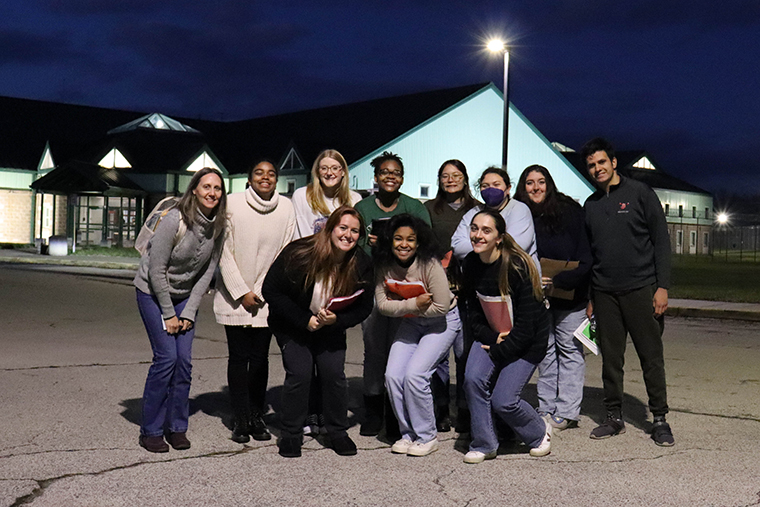Wrestling with Hope
Anthropology course brings Washington students and female prisoners together to explore hope and learn from one another.

It is the final class of Fall 2023's Anthropology of Hope, the last group project has been presented, and everyone has had a slice of pizza. Now each student has one last assignment: to present their final thoughts on the course to their classmates. Students read original poetry, quotes from the semester's reading that were meaningful to them, excerpts of stories they have written, or other texts wrestling with hope in challenging times. Nearly all of them express their gratitude for the course and for one another.
In many ways, ANTH340 is a course that any college student might take. However, there are two profound differences: almost half the class wears a single-color uniform with DOC stamped across the back, and the class is held inside the Baylor Women's Correctional Institution in New Castle, Delaware.
Anthropology department chair Emily Steinmetz drives the 11 campus-based students there once a week. Anthropology of Hope is the latest course Steinmetz has offered as part of the Inside Out Prison Exchange Program, established at Temple University in 1997.
“The goal is to really facilitate dialogue among the group and facilitate our learning by talking with people to find points of commonality as well as difference,” Steinmetz said of the program and the classes she has taught at the Baylor facility since 2019.
The connections between inside (incarcerated) and outside (campus-based) students are apparent on the December evening when they are together for the last time. (All are Washington students receiving four credits in anthropology, making the inside and outside terminology the preferred way to distinguish them.) The institution does not allow students to learn each other's last names or keep in touch afterward, making this last class a final goodbye. While the mood is celebratory and grateful, some tears are shed.
“We live in a society that does not permit or encourage hopefulness. We always talk about the struggle, the stress,” said outside student Asia, as she provided her final reflections. “That is what this class has helped me with. This has been my favorite class in college so far. I really love you guys. You are amazing.” Steinmetz said she has seen profound impacts on outside students in every course she has taught at Baylor, ranging from the “embodied learning” regarding the sometimes unpredictable circumstances in a prison to the appreciation for inside students' lives and their drive for education. Every semester, at least one student changes or solidifies their career plans to pursue related work: law school, substance abuse counseling, therapy, or social work.
“It has definitely helped me realize what I want to do after I graduate,” said English major Piper, who also has a minor in journalism, editing, and publishing. “I really just want to help people and communicate well with people and understand where people are coming from.”
Inside students also cited profound impacts from the course. Monee said the class helped her “not be afraid to say things that are uncomfortable to hear.” An'Deshia found the course so liberating that she wrote a 264-page memoir during the semester. It was the first college class for both, and they plan to continue taking courses.
This spring, Juyoun Jang, a visiting assistant professor in the English department, is teaching an Inside Out course on memoir. “I see education as a vital tool for fostering personal, intellectual, and spiritual growth, as well as for nurturing empathy and healing,” Jang said. “My goal is not just to educate but to instill confidence and hope for a second chance at life."
Many of the students at Baylor are making plans for their own second chances, taking every course offered. Carrie is one of those students determined to gain as much education as possible. She has taken every course Steinmetz has offered.
“It doesn't matter what Emily teaches. She pushes my boundaries of things I want to learn,” Carrie said. “I've gotten a better sense of me and what I want to do with my future.”
Every student remarked on the class's positive impact and how the subject matter resonated. Lindsay and Nana both talked about how essential hope is to their daily lives in prison. And the value of broadening their own perspectives was mentioned by most of the students, inside and outside alike.
“People want a variety of things out of education, and that's true in a prison, too,” Steinmetz said. “It is not always about jobs. It is about living a life of meaning and being able to think critically about how we engage with our community.”
— Mark Jolly-Van Bodegraven